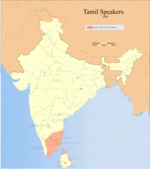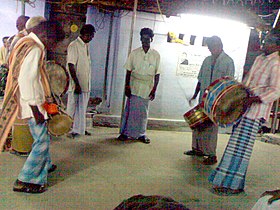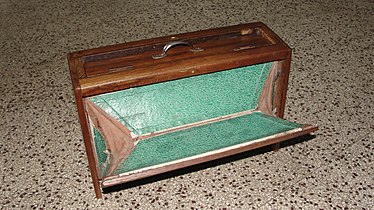Music of Tamil Nadu
This article needs additional citations for verification. (July 2020) |

| Part of a series on |
| Tamils |
|---|
 |
|
Tamil portal |
Music of Tamil Nadu has a long tradition and history going back thousands of years. Music is a very important aspect of marriage and temple festival
Ancient music
The tradition of Tamil music goes back to the earliest period of
Pannisai

There are 72 basic scales on the octave, and a rich variety of melodic motion. Both melodic and rhythmic structures are varied and compelling. This is one of the world's oldest and richest musical traditions.[1] Songs have been composed by great artists and handed down through generations of disciples.
The composers belonging to the
Folk music


Folk singing remains popular, especially in rural areas; elements of the traditional styles are sometimes used in film music. There are contemporary enthusiasts, like Vijayalakshmi Navaneethakrishnan and Pushpavanam Kuppuswamy, who have worked to revive popular interest in the folk music of Tamil Nadu. The urumee mellam also remains as one of the more popular forms of folk music in rural Tamil Nadu and the ensemble is most often played with an urumee and the nadaswaram as the instrument of choice.
The rural hill tribes of Tamil Nadu each have their own folk traditions. The Pulayar, for example, perform melodies called talams which are said to come from the cooing of birds. Each talam is named after a deity, including Kunhanada talam, Mangalanada talam and Karaganachi talam.
Gaana
Gaana is a rap-like "collection of rhythms, beats and sensibilities native to the Dalits of Chennai."[2][3] It evolved over the past two centuries, combining influences from the siddhars (tantric adepts) of ancient Tamilakam, Tamil Sufi saints, and more.[2] Gaana songs are performed at weddings, stage shows, political rallies, and funerals. Performers sing about a wide range of topics, but the essence of gaana is said to be "angst and melancholy" based in life's struggles.[2] In the past few decades, the genre has entered the music of the mainstream Tamil film industry and gained popularity.[2][4] Contemporary gaana bands like The Casteless Collective are bringing the genre to new audiences while using it for social activism, especially against caste discrimination.[2]
Film music

The film music of Tamil Nadu is widely known for its innovation and eclecticism. Scores may showcase blends of Carnatic, Western and other instruments, with a range of melodic and rhythmic patterns. Orchestral themes and minimalist songs often feature. Recent trends show the prevalence of
Instruments
-
Yaarl
-
Thannumai
-
Pambai
-
Veena
-
Muzavu
-
7 mouthed pot
-
Horn
-
Seevali
-
Udukkai
-
Nadaswaram
-
Tamil folk artists at a funeral
-
Nadaswaram artist
-
Tamil drum
-
Shruti box
Sounds
-
Parai Attam
-
References
- ^ "History of Music, Origins". The Carnatica Group. Carnatica.net. Retrieved 3 July 2007.
- ^ OCLC 1134074309.
- ISSN 0971-751X. Retrieved 23 October 2019.
- ISSN 0971-751X. Retrieved 27 March 2021.














